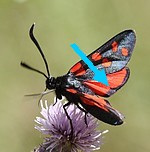| |
| | 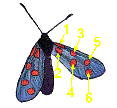 | |  | | |
| | numbering of the spots | | | | |
| | | | | | | |
| | | | | | | |
| | choice A |  | - 6 red spots of various size
- spots No.3&No.4 are not touching each other, spot No.3 being much smaller than spot No.4
- spot No.4 is square
- the thickness of the black border on the hindwing is irregular
- small-sized Burnet, very local in the South-East part of France
| 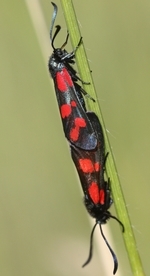 | Zygaena viciae ssp charon | |
| | | | | | | |
| | | | | | | |
| | | | | | | |
| | choice B |  | - 6 red spots of similar size, though spot No.6 can be small and even hardly visible
- spots No.3&No.4 are often touching each other (or they are slightly remote from each other)
- spot No.4 is usually rectangular and its longest side is perpendicular to the brim of the wing
- on the underside of the forewing, spots are visible but do not merge into a single red area
| 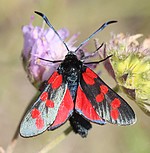
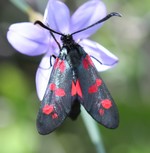 | 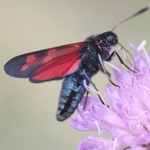 | Zygaena filipendulae (6-spotted form) |
| | | | | | | |
| | | | | | | |
| | | | | | | |
| | choice C |  | - 6 red spots of similar size, usually remote from each other and often circled with a thin border of black
- the antenna tip is whitish
- spot No.4 is usually rounded (sometimes rectangular or irregular)
- on the underside of the forewing, spots merge into a single red area whose limits are well defined
- the black border on the hidwing is thin and is dentate in its middle (blue arrow)
| 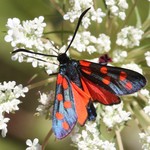 | 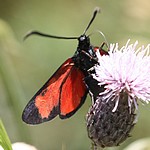 | |
| | | | | | | |
| | | | | | | |
| | | | | | | |
| | | | | | | |
| | | | | | | |
| | | | | | | |
| | | | | | | |
| | | | | | | |
| | | | | | | |
| | | | | | | |












